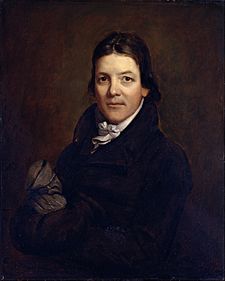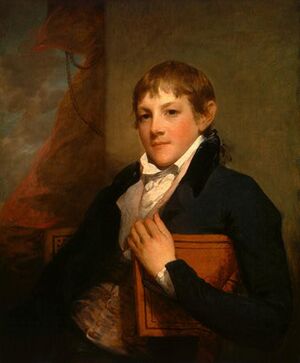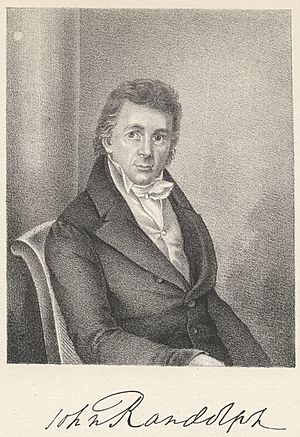John Randolph of Roanoke facts for kids
Quick facts for kids
John Randolph of Roanoke
|
|
|---|---|

Portrait of Randolph by John Wesley Jarvis (1811)
|
|
| 8th United States Minister to Russia | |
| In office May 26, 1830 – September 19, 1830 |
|
| President | Andrew Jackson |
| Preceded by | Henry Middleton |
| Succeeded by | James Buchanan |
| United States Senator from Virginia |
|
| In office December 26, 1825 – March 3, 1827 |
|
| Appointed by | John Tyler |
| Preceded by | James Barbour |
| Succeeded by | John Tyler |
| Member of the U.S. House of Representatives from Virginia |
|
| In office March 4, 1799 – March 3, 1813 |
|
| Preceded by | Abraham B. Venable |
| Succeeded by | John Kerr |
| Constituency | 7th district (1799–1803) 15th district (1803–13) |
| In office March 4, 1815 – March 3, 1817 |
|
| Preceded by | John W. Eppes |
| Succeeded by | Archibald Austin |
| Constituency | 16th district |
| In office March 4, 1819 – December 26, 1825 |
|
| Preceded by | Archibald Austin |
| Succeeded by | George W. Crump |
| Constituency | 16th district (1819–23) 5th district (1823–25) |
| In office March 4, 1827 – March 3, 1829 |
|
| Preceded by | George W. Crump |
| Succeeded by | Thomas T. Bouldin |
| Constituency | 5th district |
| In office March 4, 1833 – May 24, 1833 |
|
| Preceded by | Thomas T. Bouldin |
| Succeeded by | Thomas T. Bouldin |
| Constituency | 5th district |
| Personal details | |
| Born | June 2, 1773 Cawsons, Virginia Colony, British America |
| Died | May 24, 1833 (aged 59) Philadelphia, Pennsylvania, U.S. |
| Resting place | Hollywood Cemetery, Richmond, Virginia |
| Political party | Democratic-Republican |
| Alma mater | College of New Jersey Columbia College |
| Profession | Planter |
| Signature | |

John Randolph (born June 2, 1773 – died May 24, 1833), also known as John Randolph of Roanoke, was an American planter and politician from Virginia. He served in the House of Representatives many times between 1799 and 1833. He was also a Senator from 1825 to 1827. In 1830, he served as the Minister to Russia under President Andrew Jackson.
Randolph was known for his quick thinking and sharp wit. He strongly believed in republicanism. He supported a society based on farming and trade. His conservative ideas came from his family estate and the values of his home in Southside Virginia. He was against the War of 1812 and the Missouri Compromise of 1820. He also spoke often about taxes, manufacturing, and money.
Randolph had mixed feelings about slavery. He helped start the American Colonization Society in 1816. This group aimed to send free Black people to a colony in Africa. However, he also believed slavery was needed in Virginia at the time. He owned hundreds of slaves on his tobacco plantation. But in his will, he arranged for his slaves to be freed and given land in the free state of Ohio. They later founded towns like Rossville and Rumley.
His supporters admired his strong personality and his love for education. Others, especially those who supported democracy, found him a bit strange. Randolph was good at campaigning for elections. He spoke directly to farmers, using entertaining speeches. This helped him gain strong support from voters. His ideas about limited government are still popular with conservatives today.
Contents
Early Life and Education
John Randolph was born in Cawsons, Colony of Virginia, in 1773. His family was wealthy and owned tobacco plantations. His parents were John Randolph and Frances Bland. Both the Randolph family of Virginia and the Bland family of Virginia were important "First Families of Virginia." His relatives included famous figures like Thomas Jefferson.
His father died when John was two years old. His mother remarried in 1778 to St. George Tucker. Tucker was a respected lawyer and later became a judge.
Learning and Schooling
Randolph first learned from private teachers. He then attended the College of New Jersey and Columbia College in New York City. He and his brothers did not focus on their studies. They left college after running out of money.
Later, John studied law in Philadelphia with his cousin Edmund Randolph. But he never became a practicing lawyer. In 1792, he attended William & Mary College in Virginia. He left after a disagreement with another student led to a duel. This ended his formal education.
Political Career and Public Service
At just 26 years old, Randolph was elected to the Sixth United States Congress. He served in the House of Representatives from 1799 to 1813. He was reelected many times. Even though he often criticized slavery, he also defended the rights of wealthy slaveholders in Virginia. He believed that ending slavery would be bad for both Black and white people.
In 1803, a politician named William Plumer described Randolph. He noted Randolph's striking appearance, often wearing boots and spurs. Plumer said Randolph was a very slight man but a powerful speaker. He believed Randolph's talents were "far above mediocrity."
Randolph led the Committee on Ways and Means for several Congresses. He was a leader of the Democratic-Republican Party. In 1806, he disagreed with President Thomas Jefferson. Randolph felt Jefferson was moving away from the original ideas of their party. He then started a group called the Tertium quids. This group wanted to limit the power of the federal government. They believed wealthy slaveholders should lead Virginia and the country.
Randolph helped with the impeachment of Judge John Pickering in 1804. However, he was criticized for how he handled the failed impeachment of Supreme Court Justice Samuel Chase later that year. In 1807, he was the leader of a jury looking into charges against Aaron Burr. He became angry with President Jefferson during this time.
Randolph lost his election in 1812 because he was against the War of 1812. But he was reelected in 1814 and 1816. He served again from 1819 until 1825. During the debate over the Missouri Compromise, he strongly defended slaveholders.
In 1825, Randolph was appointed to the U.S. Senate. He served until 1827. While in the Senate, he gave very long speeches. In 1825, he spoke for several days against President John Quincy Adams's plans. These plans would have helped industries in New England more than the Southern states. This was the first time a senator used a very long speech, known as a filibuster, to delay a vote.
Randolph often spoke in favor of slavery during his career. He did not believe in universal freedom for enslaved people. He was also a delegate at the Virginia Constitutional Convention of 1829-1830. In 1830, President Andrew Jackson made him the U.S. Minister to Russia. He resigned a few months later due to health issues.
Death, Legacy, and Honors
Randolph was elected to Congress again in 1832. He served until his death in Philadelphia on May 24, 1833. He never married. John Randolph is buried in Hollywood Cemetery in Richmond, Virginia. His home in Virginia, Roanoke Plantation, is still standing today. It was added to the National Register of Historic Places in 1973.
- Randolph became a member of the American Antiquarian Society in 1815.
- A modern conservative political group, the John Randolph Club, is named after him.
- His ideas about limited government are still important to conservatives today.
Several places are named in his honor:
- Randolph-Macon College and Randolph College.
- Randolph County, Arkansas, Randolph County, Georgia, and Randolph County, Missouri.
- The World War II Liberty Ship SS John Randolph.
- Randolph-Henry High School in Charlotte Court House, Virginia. It was named in honor of him and Patrick Henry.
Personality and Character
John Randolph was a Virginia gentleman and a great speaker. But after five years as a leader in the House, he became an outsider. His unique personality might have been affected by his poor health throughout his life.
The poet John Greenleaf Whittier wrote a poem about Randolph. It described his "strange brilliance." Whittier wrote about his "Mirth, sparkling like a diamond shower" and "Clear picturings of majestic thought upon a ground of madness."
In 1826, Randolph gave a Senate speech about how John Quincy Adams became president. Henry Clay, who became Adams's Secretary of State, felt insulted. Clay challenged Randolph to a duel. They met on the Virginia side of the Potomac River. During the duel, Randolph fired his gun into the air. This showed he would not try to hurt Clay. Clay then ended the duel. Randolph joked, "You owe me a coat, Mr. Clay," because Clay's bullet had torn his clothes. They became friends again.
Randolph usually saved his strong words for Congress. He often dressed in a fancy way. He was sometimes seen with his slaves and hunting dogs. Once, Speaker of the House Henry Clay ordered Randolph to remove his dog from the House floor. No one had dared to do that before.
Despite his strong personality, Randolph had many friends from different political parties. For example, he was close with Federalist Congressman Harmanus Bleecker. They even exchanged portraits as a sign of their friendship.
Religious Beliefs
Randolph was raised in the Episcopal Church. As a young man, he was not very religious. But in 1818, he had a spiritual experience that changed him. He wrote to friends about his new faith.
After this, Randolph became very religious. He even wrote that he was afraid to take communion because he wanted to be truly worthy. The people who carried out his will included Virginia's bishop, William Meade.
Views and Actions on Slavery
John Randolph was one of the founders of the American Colonization Society (ACS) in 1816. This group aimed to help free Black people move to a colony in Africa. Like some other slaveholders, Randolph had mixed feelings about slavery. His older brother, Richard Randolph, had freed his slaves in his will. This led to the creation of a free Black community called Israel Hill.
In 1819, John Randolph also wrote a will to free his slaves after his death. He wrote, "I give and bequeath to all my slaves their freedom, heartily regretting that I have ever been the owner of one." In 1822, he added to his will. He said money should be used to buy land and supplies for his freed slaves in the free state of Ohio. Each slave over 40 years old would receive 10 acres of land.
His will provided for the freedom of hundreds of slaves. Even though his will was challenged in court, it was eventually upheld. In 1846, 383 former "Randolph Slaves" arrived in Cincinnati. They settled in Rumley, Ohio and Rossville, Ohio.
Electoral History
- 1799: Randolph was elected to the U.S. House of Representatives.
- 1801: Randolph was reelected without opposition.
- 1823: Randolph was reelected without opposition.
- 1825: Randolph was reelected without opposition.
- 1827: Randolph was reelected without opposition.
- 1833: Randolph was reelected without opposition.
Cultural Depictions
- John Randolph was played by Edwin Maxwell in the 1942 film Ten Gentlemen from West Point.
- Edgar Allan Poe mentioned Randolph in his 1845 story "The Facts in the Case of M. Valdemar." Poe described a character whose legs looked like John Randolph's. Poe might have seen Randolph when he lived in Richmond, Virginia.
Works and Writings
- Randolph, John. Letters of John Randolph, to a Young Relative, 1834. Available online.
- Randolph, John. Collected letters of John Randolph of Roanoke to Dr. John Brockenbrough, 1812–1833, edited by Kenneth Shorey, 1988.
Images for kids
 | Chris Smalls |
 | Fred Hampton |
 | Ralph Abernathy |


